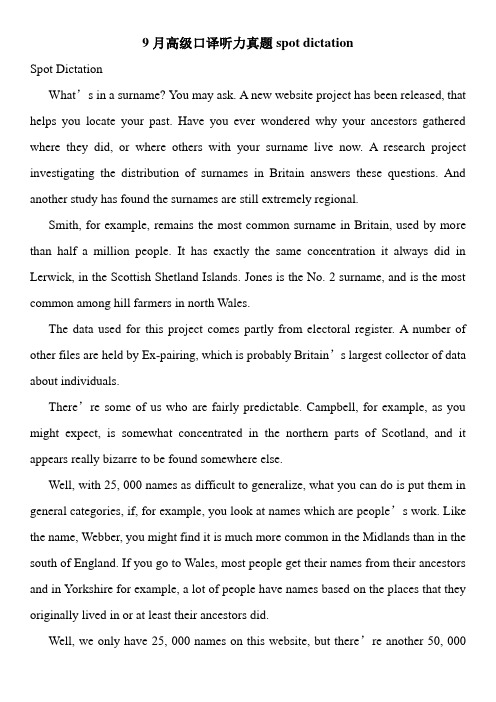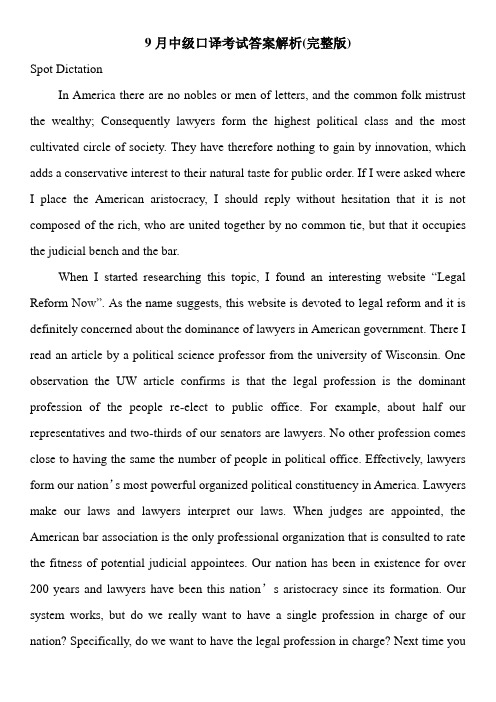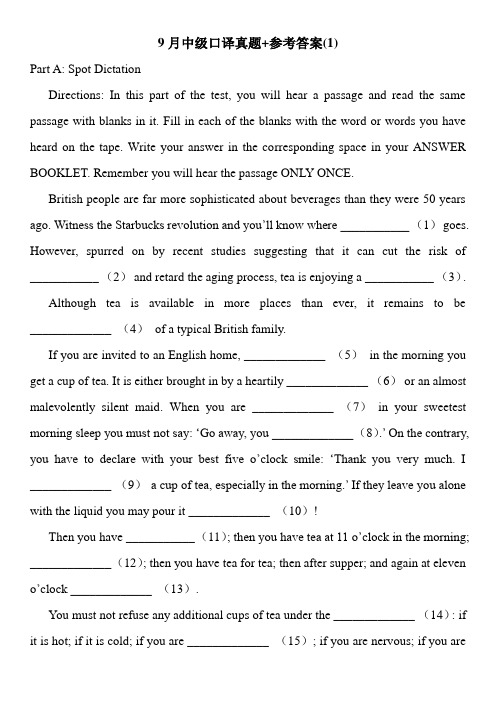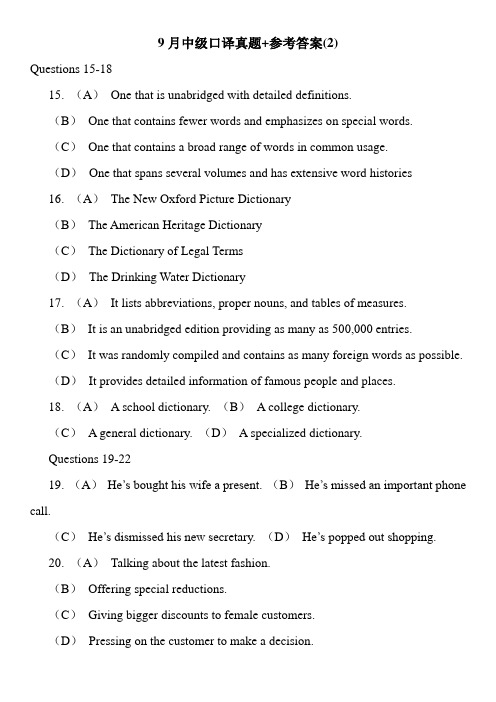2013年9月中级口译听力真题 Spot Dictation 含解析
9月高级口译听力真题spot dictation

9月高级口译听力真题spot dictationSpot DictationWhat’s in a surname? You may ask. A new website project has been released, that helps you locate your past. Have you ever wondered why your ancestors gathered where they did, or where others with your surname live now. A research project investigating the distribution of surnames in Britain answers these questions. And another study has found the surnames are still extremely regional.Smith, for example, remains the most common surname in Britain, used by more than half a million people. It has exactly the same concentration it always did in Lerwick, in the Scottish Shetland Islands. Jones is the No. 2 surname, and is the most common among hill farmers in north Wales.The data used for this project comes partly from electoral register. A number of other files are held by Ex-pairing, which is probably Britain’s largest collector of data about individuals.There’re some of us who are fairly predictable. Campbell, for example, as you might expect, is somewhat concentrated in the northern parts of Scotland, and it appears really bizarre to be found somewhere else.Well, with 25, 000 names as difficult to generalize, what you can do is put them in general categories, if, for example, you look at names which are people’s work. Like the name, Webber, you might find it is much more common in the Midlands than in the south of England. If you go to Wales, most people get their names from their ancestors and in Yorkshire for example, a lot of people have names based on the places that they originally lived in or at least their ancestors did.Well, we only have 25, 000 names on this website, but there’re another 50, 000names now found in Britain and they’re particularly interesting, for they are non-British names. Most British names are fairly common and about what we can now do as such is look for the frequency of all names from different parts of the world and different faiths, religions and languages. And what there is in names is actually extremely useful for researchers in anthropology and sociology may find a lot about different immigrant groups and their descendants now living in this country.。
2013中级口译真题

2013中级口译真题
《上海市外语口译岗位资格证书》培训与考试项目是上海市委组织部、上海市人事局、上海市教育委员会、上海市成人教育委员会等政府部门共同设立的上海市紧缺人才培训工程的高层项目之一。又称SIA(Shanghai Interpretation Accreditation),考试每年开考两次。3月中旬和9月中旬的一个周日为综合笔试,合格者可参加口试。上海市外语口译岗位资格证书考试项目1994年启动,1997年3月开考了英语中级口译。1997年9月开考了日语口译。十年来,报考总人数已达150000人。基本要求一名合格的译员应具有听、说、读、写、译五项基本技能且都能达到较高的水准。因此,对于选英语中级口译课的学生也应有较高的要求。一) 听力能力和水平提高听力水平是其它基本技能发展的关键,也是综合英语交际能力的基础,要求学生达到四听懂、两听译。1.听懂一般说话者的含意;2.听懂交际英语会话;3.听懂一般性讲座;4.听懂一般广播或电视短篇;5.听懂和理解英语短句并译成汉语;6.听懂和理解英语片段并译成汉语。二) 笔译能力和水平译者不仅具有较高的英文水平,而且对汉语亦应有较深的造诣;否则会造成理解上的困惑和措辞上困难。译者应知识渊博,广泛涉猎。这样笔译时才能得心应手,游刃有余。笔译是文字工作,差之毫厘,失之千里。下笔应慎之又慎,切忌马虎懈怠。三) 口语能力和水平1.具有口头交际手段的能力。2.具有良好的口语能力,可从事一般的生活翻译、陪同翻译、国际研讨会翻译以及外事接待、外贸业务洽谈等工作。四) 口译能力和水平1.具有基本口译技能,可从事一般的生活翻译、陪同翻译、国际研讨会翻译以及外事接待、外贸业务洽谈等工作。2.英语中级口译考试旨在测试考生的“英译汉”和“汉译英”的口译能力以及对口译基本技巧的掌握程度。考生在口译时应能准确传达原话意思,语音、语调正确,表达流畅、通顺,句法规范,语气恰当,用词妥切。3.考生应具有口译短篇演讲文的能力。4.考生应具有良好的听译能力。即逐句听事先录制好的原文,然后逐句将原文的内容准确而又流利地从来源语口译成目标语。编辑本段考试介绍上海中级口译考试1. 报考对象:任何人都可以报考2. 考试难度:目前笔试难度逐年增加,阅读文章均选自外刊,未做任何修改,阅读难度相当与托福阅读难度,并且有和高口接轨的趋势。听力部分难度比较大,尤其是听译,更加考验考生的水平。总体来说,中口笔试的难度要高于CET6,高口笔试难度高于TEM8。3. 考试形式:根据口译特点,以测试口译水平为主要目标,从听、说、读、译(笔译、口译)等四个方面对考生的语言运用能力进行全面测试。考试采取客观试题与主观试题相结合,单项技能测试与综合技能测试相结合的方式,如在第一阶段笔试中,客观试题约占笔试试卷总分的35%,主观试题约占笔试试卷总分的65%4. 考试分两个阶段:笔试、口试笔试共分四部分。总考试时间为150分钟,满分为250分。(150分合格)1: 听力40分钟/90分;2:阅读50分钟/60分;3:英译汉30分钟/50分;4:汉译英30分钟/50分。凡第一阶段合格的考生方可参加第二阶段口试。5. 第二阶段口试共分两部分:口语与口译。考试时间为25分钟左右6. 每年的3月、9月进行笔试,笔试后1个月左右进行口试。7. 考试时间:13:30分:进考场 ;14:00: 正式考试 ;14:40: 听力结束 ;16:30: 结束考试 上海中级口译笔试分值A:听力:1: spot dictation: 20空/30分;B: listening comprehension: 30题/30分 ;C: 听译:5句子+2短文/30分。D: 阅读:30题/60分 ;E: 英译汉/50分;F: 汉译英/50分。 上海中级口译听力1: spot dictation ;2: statements 10个题 (4个选项中选一个与所听到的句子意思最接近的 ;3: talks and conversations 20个题(根据提问4个选一个答案)4: listening translation : 1 sentence translation 5句;2 passage translation 2段编辑本段口试流程中级口译口试:第一部分 3-minute talk这部分要求大家在规定的三分钟内就所给的一个英文题目进行口语表达。要求做到无重大语法错误,表达流畅,能围绕题目进行论点阐述,论证,无偏题,跑题问题。第二部分 4 passages of interpretation这部分共有四段口译,两段英翻中,两段中翻英。每一段分四小段翻完,即共有十六小段。每小段通常在两到三小句,其中至少应有一句长难复杂句。每小段结束后磁带中发出“嘟”的声音,考生必须在第二声“嘟”之前把听到的段落翻译出来。每小段间隔时间约为22到25秒钟。每小段字数大约为60-80字。 口试评分标准及通过率口试与笔试最大的区别在于没有具体的分数,而只有及格与不及格之分。中级口译共十六小段,必须要确保翻对其中的十一小段。即最多只能错五小段。如只翻对十小段,错六小段,虽然只差一小段,但结果仍然是不过。所以口试是相对来说比较残酷的。这也是口试通过率特别低的主要原因,中口一般为不超过30%,高口一般不超过20%。如一个考场一天有二十名考生,中口最多过六到七人,高口最多过三到四人。具体到每小段的时候,考官会遵循三分之二正确率的原则。即如一小段中有六个关键信息,考生必须正确翻出至少三分之二的内容才算这小段通过,如翻对二分之一,则算不及格。编辑本段报名时间笔试报名时间:每年6月20-26日,12月19日-30日3月的考试报名时间通常在前一年的12月19日-12月30日9月的考试报名时间在当年的6月20日-6月26日。如果是明年3月的中级口译,那么今年12月19日-30日就要准备报名请于每年的4月或10月的上旬在本网“新闻公告”栏查询报名日期及注意事项编辑本段报名费英语高级口译报名费210元;英语中级口译报名费186元,口译+笔试一共是396元PS:1、上海考点报名一律不收代办费;2、长三角地区另收代办费20元/人次;3、其他省市考点另收代办费30元/人次。编辑本段报名地点1、口译考试办公室报名点:浦东东方路121号(后门钱仓路400号) 电话:63774103[笔试、日语口试报名点]2、第二工业大学成人与继续教育学院报名点:陕西北路80号底楼103室 电话:62534086[笔试报名点]3、上海外国语大学继续教育学院:大连西路550号三号楼底楼中门厅 电话:65422405 [笔试、英语口试报名点]4、上海交大外语学院:华山路1954号教学二楼316室 电话:62932471 [笔试报名点]5、PCEC明天学院: 国权路580弄1号(复旦大学步行街)电话:55664355 [笔试报名点]6、松江大学城:文汇路169号-上海对外贸易学院成人教育学院招生报名处 电话:67703141[笔试报名点]编辑本段考点1、笔试考点:(1)上海外国语大学(2)上海财经大学(3)东华大学(4)华东师范大学(5)上海远程教育集团学习广场(原上海电视大学考点)(6)上海对外贸易学院(7)华东理工大学(8)上海师范大学(9)上海应用技术学院(10)上海工程技术大学2、口试考点:(1)上海外国语大学(英语高级口译口试、英语中级口译口试、英语口译基础能力笔试、口试)(2)上海应用技术学院(日语高级口译、日语中级口译)3.外省市报名点和考点:(一)南京:1、南京金陵国际语言进修学院(笔试、英语口试报名点;英语口试承办单位)报名地址:南京市长江路262号2、南京师范大学(笔试承办单位)单位地址:南京市亚东新城区文苑路1号(二)宁波:宁波市人事考试中心(笔试、英语口试报名点;笔试、英语口试承办单位)报名地址:宁波市柳汀街557号(三)杭州:杭州市人事考试中心(笔试、英语口试报名点;笔试承办单位)报名地址:杭州市文晖路97号(四)苏州:苏州大学外国语学院(笔试、英语口试报名点;笔试承办单位)报名地址:苏州市十梓街1号苏州大学本部崇远楼109室(五)青岛:青岛大学师范学院英语系(笔试、英语口试报名点;笔试承办单位)报名地址:青岛市青大一路16号教学楼518室(六)武汉:1、湖北楚才考试服务有限公司(笔试、英语口试报名点;笔试、英语口试承办单位)报名地址:武汉市东湖路147号2、武汉江岸区华英口译培训学校(笔试报名点)报名地址:武汉洪山路2号湖北科教大厦A座1502室(七)深圳:深圳市新世界文化发展有限公司(笔试、英语口试报名点;笔试承办单位)报名地址:深圳市深南中路新闻大厦2号楼7楼(八)烟台:鲁东大学外国语学院(笔试、英语口试报名点;笔试承办单位)报名地址:烟台市芝罘区世学路184号10号楼109室(九)南昌:南昌大学外国语学院(笔试、英语口试报名点;笔试承办单位)报名地址:南昌市前湖校区学府大道1066号外经楼318室(十)无锡:1、江南大学外国语学院(蠡湖校区)(笔试、英语口试报名点;笔试承办单位)报名地址:无锡市蠡湖大道1800号文科楼A243外国语学院资料室2、江南大学报名点(笔试、英语口试报名点)报名地址:无锡市人民东路20号现代广场3楼306��
2013年9月中级口译英译汉真题及答案解析

2013年9月中级口译英译汉真题及答案解析2013年09月16日18:17 沪江英语微博我有话说编辑点评:2013年秋季上海中高级口译考试于今日9月15日开考,沪江英语在考后第一时间提供真题、解析、答案信息,本文为2013年9月中级口译英译汉答案部分。
原文:American are much more likely than citizens of other nations to believe that they live in a meritocracy, i.e. Government by people selected according to merit. But this self-image is a fantasy: America actually stands out as a the advanced country in which it matters most who your parents were, the country in which those born on one of society’s lower rungs have the least chance of climing to the top or even to the middle。
And if you ask why America is more class-bound in practice than the rest of the Western world, a large part of the reason is that our government falls down on the job of creating equal opportunity。
The failure starts early: in America, the holes in the social safety net mean that both low-income mothers and their children are all too likely to suffer from poor nutrition and receive inadequate health care. It continues once children reach school age, where they encounter a system in which the afflent send their kids to good, well-financed public schools or, if they choose, to private schools, while less-advantaged children get a far worse education。
年9月中级口译考试真题,答案与解析

年9月中级口译考试真题,答案与解析Spot Dictation:We all have problems and barriers that block our progress or prevent us from moving into new areas. Our problems might include the fear of speaking in front of a group anxiety about math problemsor the reluctance to sound silly trying to speak a foreign language. It's natural to have problems and barriersbut sometimes they limit our experience so muchwe get bored with life. When that happensconsider the following three ways of dealing with the problem or barrier.One way is to pretend it doesn't exist. Avoid itdeny itand lie about it. It's like turning your head the other wayputting on a fake grinand saying"Seethere's really no problem at all. Everything is fine."In addition to looking foolishthis approach leaves the barrier intactand we keep bumping into it. Soa second approach is to fight the barrierto struggle against it. This usually makes the barrier grow. It increases the barrier's magnitude. A person who is obsessed with weight might constantly worry about being fat. He might struggle with it every daytrying diet after diet. And the more he strugglesthe bigger the problem gets.The third alternative is to love the barrier. Accept it. T otally experience it. Tell the truth about it. Describe it in detail.Applying this process is easier if you remember o ideas. First loving a problem is not necessarily the same as enjoying it. Love in this sense means total and unconditional acceptance. Secondunconditional acceptance is not the same as unconditional surrender. Accepting a problem is different than giving up or escaping from it. Ratherthis process involves escaping into the problemdiving into it headfirstand getting to know it in detail.Often the most effective solutions ewhen we face a problem squarelywith eyes wide openthen we can move through the probleminstead of around it. When you are willing to love your problemsyou drain them of much of their energy.【评析】本文选自Dave Ellis 的著作Being a Master Student其中的一个章节:Love your problems and experience your barriers,本文主要介绍了解决问题的三种办法,第一种是直接无视它,就当不存在;第二种是正视它,挑战它,第三种则是爱上困难,充分体验。
9月中级口译考试答案解析(完整版)

9月中级口译考试答案解析(完整版)Spot DictationIn America there are no nobles or men of letters, and the common folk mistrust the wealthy; Consequently lawyers form the highest political class and the most cultivated circle of society. They have therefore nothing to gain by innovation, which adds a conservative interest to their natural taste for public order. If I were asked where I place the American aristocracy, I should reply without hesitation that it is not composed of the rich, who are united together by no common tie, but that it occupies the judicial bench and the bar.When I started researching this topic, I found an interesting website “Legal Reform Now”. As the name suggests, this website is devoted to legal reform and it is definitely concerned about the dominance of lawyers in American government. There I read an article by a political science professor from the university of Wisconsin. One observation the UW article confirms is that the legal profession is the dominant profession of the people re-elect to public office. For example, about half our representatives and two-thirds of our senators are lawyers. No other profession comes close to having the same the number of people in political office. Effectively, lawyers form our nation’s most powerful organized political constituency in America. Lawyers make our laws and lawyers interpret our laws. When judges are appointed, the American bar association is the only professional organization that is consulted to rate the fitness of potential judicial appointees. Our nation has been in existence for over 200 years and lawyers have been this nation’s aristocracy since its formation. Our system works, but do we really want to have a single profession in charge of our nation? Specifically, do we want to have the legal profession in charge? Next time youvote, that’s something to think about.评析:这篇文章是关于律师在美国的地位。
中级口译真题+参考答案

9月中级口译真题+参考答案(1)Part A: Spot DictationDirections: In this part of the test, you will hear a passage and read the same passage with blanks in it. Fill in each of the blanks with the word or words you have heard on the tape. Write your answer in the corresponding space in your ANSWER BOOKLET. Remember you will hear the passage ONLY ONCE.British people are far more sophisticated about beverages than they were 50 years ago. Witness the Starbucks revolution and you’ll know where ___________ (1)goes. However, spurred on by recent studies suggesting that it can cut the risk of ___________ (2)and retard the aging process, tea is enjoying a ___________ (3).Although tea is available in more places than ever, it remains to be _____________ (4)of a typical British family.If you are invited to an English home, _____________ (5)in the morning you get a cup of tea. It is either brought in by a heartily _____________ (6)or an almost malevolently silent maid. When you are _____________ (7)in your sweetest morning sleep you must not say: ‘Go away, you _____________ (8).’ On the contrary, you have to declare with your best five o’clock smile: ‘Thank you very much. I _____________ (9)a cup of tea, especially in the morning.’ If they leave you alone with the liquid you may pour it _____________ (10)!Then you have ___________ (11); then you have tea at 11 o’clock in the morning; _____________ (12); then you have tea for tea; then after supper; and again at eleven o’clock _____________ (13).You must not refuse any additional cups of tea under the _____________ (14): if it is hot; if it is cold; if you are _____________ (15); if you are nervous; if you arewatching TV; _____________ (16); if you have just returned home; if you feel like it; if you do not feel like it; if you have had no tea ______________ (17); if you have just had a cup.You definitely must not ______________ (18). I sleep at five o’clock in the morning; I have coffee for breakfast; I drink innumerable _____________ (19)during the day; I have the _____________ (20)even at tea-time!Part B: Listening Comprehension1. StatementsDirections: In this part of the test, you will hear several short statements. These statements will be spoken ONLY ONCE, and you will not find them written on the paper; so you must listen carefully. When you hear a statement, read the answer choices and decide which one is closest in meaning to the statement you have heard. Then write the letter of the answer you have chosen in the corresponding space in your ANSWER BOOKLET.1. (A)The program on Channel Eight reminds me of TV commercials.(B)The product advertised in the TV commercial cannot help cure my illness.(C)I don’t watch TV that much, because of the omnipresent advertis ements.(D)I have to sit on the sofa, because I am too sick to stand in front of the television.2. (A)The plane arrived at 7:30.(B)The plane arrived at 8:00.(C)The plane arrived at 9:00.(D)The plane arrived at 10:00.3. (A)I’ll ask someone else to read and check this agreement for errors.(B)I’ll think more about the agreement before making a decision.(C)It’s obvious that I’ll discuss the agreement with my assistant first.(D)It’s out of question that I shou ld get into any agreement with you.4. (A)The better members decided to cancel the meeting.(B)Less than half of the committee was away on business trips.(C)It’d be better if no one had attended this morning’s committee meeting……(D)The meeting was cancelled because of low attendance.5. (A)Supermarkets in the inner city and the suburbs are usually owned by the same company.(B)Products in grocery stores are more expensive than those in supermarkets.(C)There is a price difference for the same product even in shops run by the same company.(D)People prefer to shop in supermarkets, which are mostly located in the suburbs, with free parking space.6. (A)Many Americans cannot afford higher education because of the soaring college tuition fees and expenses.(B)Sending their children to college is no longer a bigger challenge for millions of Americans.(C)The American government has set the goal that it will eventually stop funding higher education institutions.(D)Nowadays, American parents have to pay more to send their children to college.7. (A)For many university graduates, the jobs they take will not be related to their academic achievements.(B)Because of economic recession, the number of university students majoring in liberal arts is declining.(C)University students who are interested in liberal arts will have more job opportunities upon graduation.(D)With high unemployment rate, many university students will have to opt for transferring to other majors.8. (A)Good business negotiators will never repeat what other people have already restated.(B)Restating by good business negotiators is not an effective way to check the information.(C)Good business negotiators are sometimes curious about other people’s restatements.(D)Restating what others have said is a good strategy for confirming understanding.9. (A)We cannot reach an agreement, let alone a spoken promise.(B)We’d better draft and then sign a written agreement.(C)We generally keep our promises in business transactions.(D)We hope you understand why we are unable to keep our promises.10. (A)I don’t think you have more to say on that topic.(B)I think we’d better talk about that in detail sometime later.(C)I am truly appreciative if you can elaborate on that topic after lunch.(D)I am busy right now, so we might as well discuss it over lunch today.2. Talks and ConversationsDirections: In this part of the test, you will hear several short talks andconversations After each of these, you will hear a few questions. Listen carefully because you will hear the talk or conversation and questions ONLY ONCE. When you hear a question, read the four choices and choose the best answer to that question. Then write the letter of the answer you have chosen in the corresponding space in your ANSWER BOOKLET.Questions 11-1411. (A)Two (B)Three (C)Four (D)Five12. (A)A profit-making private school.(B)A non-profit-making independent school.(C)A state school that is funded by non-governmental sources.(D)A secondary school that is open to the majority of British students.13. (A)Many children are no longer placed in schools according to their academic abilities.(B)Many children can afford to study in private schools, as they become part of the state system.(C)Children from wealthy families no longer choose to go and study in public schools.(D)Cleverer children will be sent to the best private schools in the country for a better development.14. (A)Clever and less bright children will mix well with each other.(B)School authorities will receive more funds from the government.(C)Most students will do well in their entrance examination for the higher education.(D)Every child will have an equal opportunity to go on to higher education.。
2013年9月高级口译听力真题Listening Comprehension 含解析

2013年9月高级口译听力真题Listening Comprehension 含解析作者:沪江英语来源:沪江英语Listening comprehension 1W: So, one of the things that I really have trouble understanding is how jazz music developed to be so different from many other kinds of music? My class notes are terrible.M: Well, what can't you understand from your notes?W: Uh, one thing is I copied down the musical training from the blackboard. What did it mean by that?M: Well, most people who became professional musicians have some kind of formal training in music. But the first people who play jazz music had almost none.W: OK, but so what? Doesn't it just mean that they weren't very good musicians?M: Well, it's not that the early jazz musicians weren't good; it's that they played their instruments differently. Let's say you are receiving formal instruction in the trumpet. First you would learn the right way to place your mouth, and the right way to use your fingers, and the right way to blow air. And then you will practice single notes and different combination of notes until you could do those correctly. And only after that, would your teacher give you a piece of music to play.W: And the early jazz musician didn't learn to play this way?M: No, the first people who play jazz music learned to play their instrument by actually trying to play a song the way they like. They were humanity, and tried to play themselves on their instruments. Because they were mostly teaching themselves, they began to express themselves in ways that formally traditionally trained musicians didn't. In traditional instruction, there is one correct way to play something, and everyone who plays tries to make the correct sound. But in jazz...W: In jazz music, there isn't one right way to play. In fact, individual musicians are supposed to interpret the music in their own style. So you are saying that this aspect of jazz developed because the first people who play jazz didn't have any formal musical training?M: Yes, I believe so.Q1: What is the woman most probably according to the conversation?Q2: What is the problem the woman has trouble understanding?Q3: How did early jazz musicians learn to play their instrument?Q4: Which of the following is true according to the conversation?Q5: Why did jazz music develop to be so different from many other kinds of music?【解析】本文难度并不大,围绕着女生的疑问以及男生的解答,讲述了爵士是如何发展成一种与其他种类相距甚大的音乐的。
9月中级口译真题+参考答案

9月中级口译真题+参考答案(2)Questions 15-1815. (A)One that is unabridged with detailed definitions.(B)One that contains fewer words and emphasizes on special words.(C)One that contains a broad range of words in common usage.(D)One that spans several volumes and has extensive word histories16. (A)The New Oxford Picture Dictionary(B)The American Heritage Dictionary(C)The Dictionary of Legal Terms(D)The Drinking Water Dictionary17. (A)It lists abbreviations, proper nouns, and tables of measures.(B)It is an unabridged edition providing as many as 500,000 entries.(C)It was randomly compiled and contains as many foreign words as possible.(D)It provides detailed information of famous people and places.18. (A)A school dictionary. (B)A college dictionary.(C)A general dictionary. (D)A specialized dictionary.Questions 19-2219. (A)He’s bought his wife a present. (B)He’s missed an important phone call.(C)He’s dismissed his new sec retary. (D)He’s popped out shopping.20. (A)Talking about the latest fashion.(B)Offering special reductions.(C)Giving bigger discounts to female customers.(D)Pressing on the customer to make a decision.21. (A)Upside down and inside out. (B)Inside out and back to front. (C)With its sleeves as trouser legs. (D)With its pattern upside down.22. (A)A V-necked pullover with short sleeves.(B)A high-necked pullover with long sleeves.(C)A white pullover with a pattern.(D)A blue pullover with a high neck.Questions 23-2623. (A)That of a creator. (B)That of a re-creator.(C)That of a receiver. (D)That of a performer.24. (A)Because we need to concentrate for our quiet thought.(B)Because we want to give full attention to the driving.(C)Because we try to avoid being caught by the patrolling police.(D)Because we intend to be as casual as possible in the driving.25. (A)In the elevator. (B)In the car.(C)In the bathroom. (D)In the church.26. (A)By perceptive and analytical listening.(B)By taking a sonic bath.(C)By attending classical concerts.(D)By listening to an emotional piece of music.Questions 27-3027. (A)His grandfather’s house. (B)His parents’ remarks.(C)A magazine. (D)A coursebook.28. (A)Enjoying visiting zoos. (B)Driving a car.(C)Making money. (D)Taking kids to a museum.29. (A)It died a few years ago. (B)It killed several tourists.(C)It is only a legend. (D)It is a living dinosaur.30. (A)No one has provided an accurate description of the animal.(B)No dead bodies of the animal have ever been found.(C)There are only 500 species living in Loch Ness.(D)The lake is not deep enough for such a huge animal.Part C: Listening and Translation1. Sentence TranslationDirections: In this part of the test, you will hear 5 sentences in English. You will hear the sentences ONLY ONCE. After you have heard each sentence, translate it into Chinese and write your version in the corresponding space in your ANSWER BOOKLET.(1)(2)(3)(4)(5)2. Passage TranslationDirections: In this part of the test, you will hear 2 passages in English. You will hear the passages ONLY ONCE. After you have heard each passage, translate it into Chinese and write your version in the corresponding space in your ANSWER BOOKLET. You may take notes while you are listening.(1)(2)。
- 1、下载文档前请自行甄别文档内容的完整性,平台不提供额外的编辑、内容补充、找答案等附加服务。
- 2、"仅部分预览"的文档,不可在线预览部分如存在完整性等问题,可反馈申请退款(可完整预览的文档不适用该条件!)。
- 3、如文档侵犯您的权益,请联系客服反馈,我们会尽快为您处理(人工客服工作时间:9:00-18:30)。
2013年9月中级口译听力真题Spot Dictation 含解析
作者:沪江英语来源:沪江英语
2013年秋季上海中高级口译考试于今日9月15日开考,沪江英语在考后第一时间提供真题、解析、答案信息,本文为2013年9月中级口译听力真题Spot Dictation部分,由沪江网校提供。
Spot dictation
Next, let's talk about earthquakes on our planet. Some countries have large numbers of earthquakes. Japan is one of them. Others do not have many. For example, there are few earthquakes in Britain. There is often a great noise during an earthquake. The ground vibrates. Houses fall down. Trains run off the lines. Sometimes, there is a heavy loss of human lives.
Earthquakes often happen near volcanoes, but this is not always true. The centers of some earthquakes are under the sea. The bottom of the sea suddenly moves. The powerful forces inside the earth break the rocks. The coast is shaken and great waves appear. These waves, also known as seismic waves, or tsunamis can travel long distances and rush over the land when they reach it. They are strong enough to break down houses and other buildings. Very often fires follow the most serious earthquakes. In 1906, the great earthquake at San Francisco broke the gas pipes. The gas escaped, and soon large numbers of fires were burning in the city. The water pipes were also shaken and broken, so it was not possible to put the fires out. There was no water. The Tokyo Earthquake of 1923 happened just before noon. People were cooking meals on their fires at that time. When the ground shook, the fires shook, too. Hot materials were thrown on the different parts of the houses, some of which were made of wood. Soon 134 fires were burning in the city.
What kind of building stands up best in an earthquake? A building with concrete walls is perhaps the best. A steel frame will make it even stronger.
The frame holds the different parts together and the walls do not easily fall. There is less chance of fire because concrete and steel do not burn. Over the years, scientists carefully studied the results of the earthquake in different parts of the world, and they are convinced that this kind of building is the safest.
【解析】
根据文意,本文类似一段关于地震的讲座。
说话者开篇就讲述了地震的危害,并在之后的段落中相继介绍了地震形成的原因,以及用1906年旧金山大地震1923年的东京大地震举例说明了地震也会伴随着大火。
最后,通过这些生动的例子,说话者又利用一个问句引出科学家们通过研究发现,钢筋水泥房是最安全的。
整篇文章没有出现特别难的生词,而且地震也是大家较为熟悉的,所以总体难度并不大。
